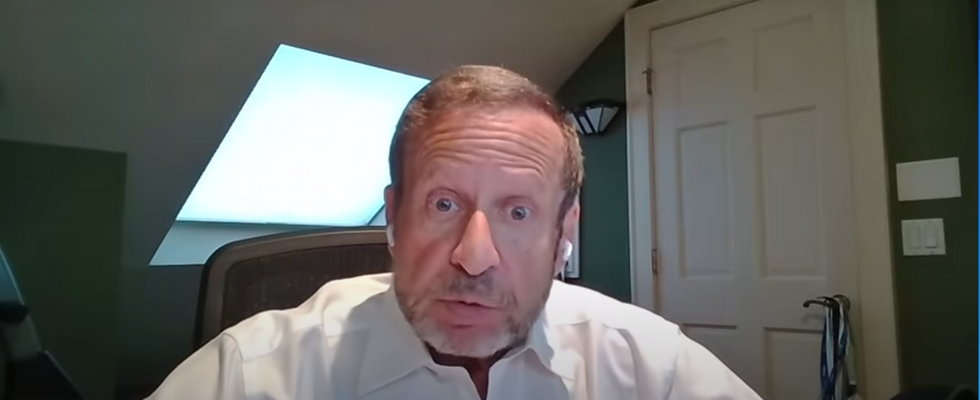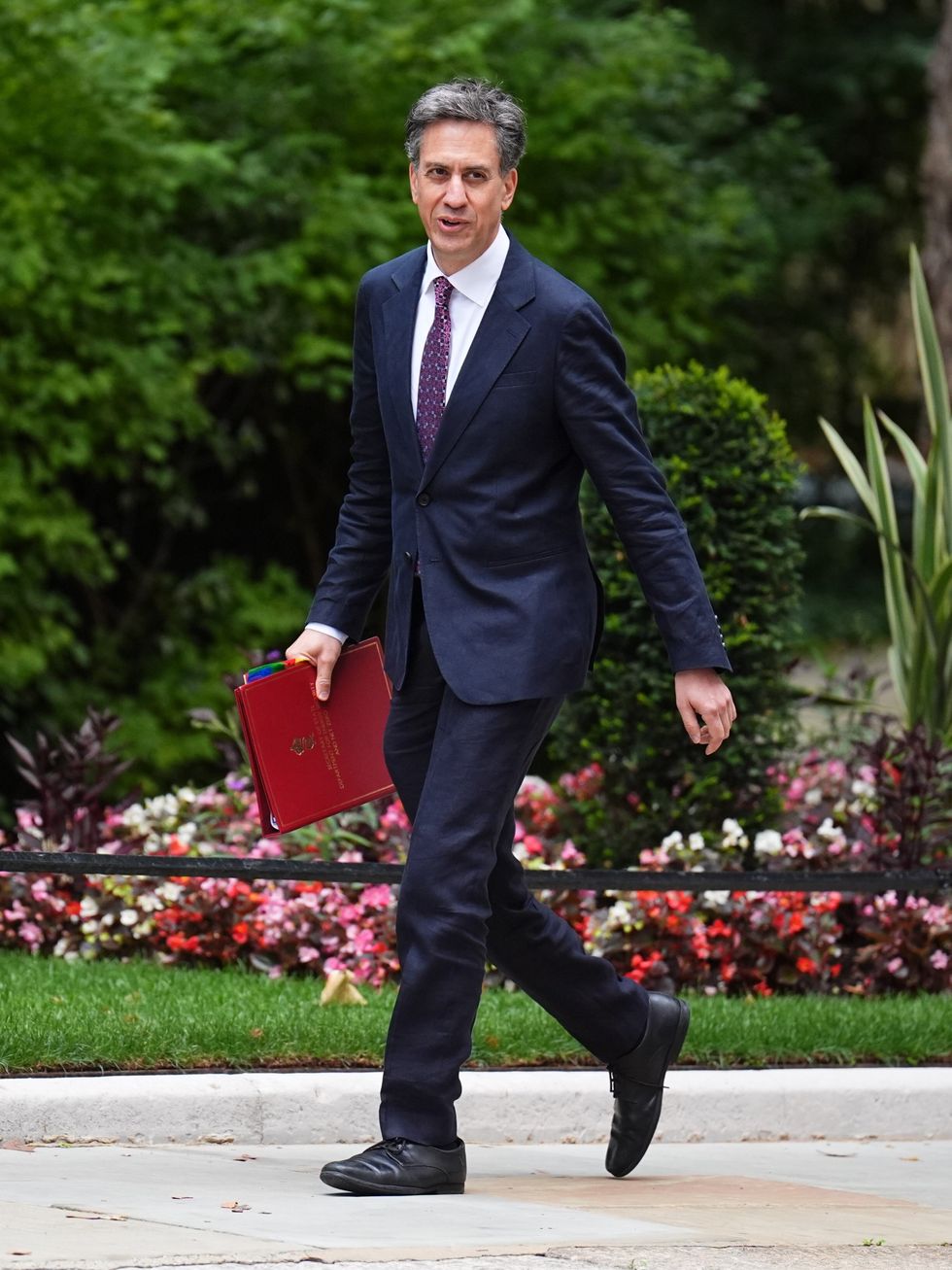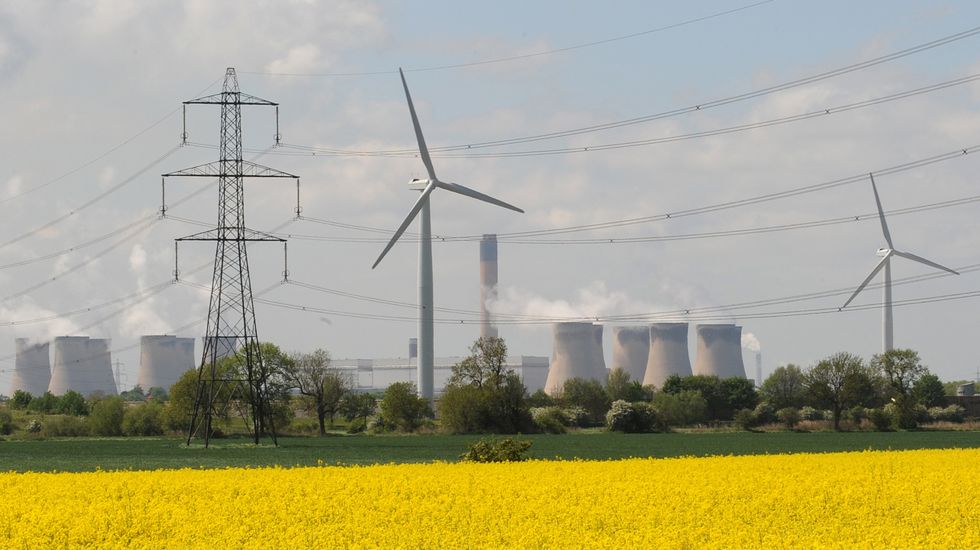Britons 'deliberately ill-informed' over 'headlong dash' to net zero as scientist urges UK to 'rethink' policy

'Economic suicide!' UK's net zero drive slammed as Steve Koonin urges Britain to 'rethink' policy
|GB NEWS
Professor Steven Koonin claimed that 'net zero fervous' has become 'extraordinarily politicised'
Don't Miss
Most Read
Trending on GB News
Britons are being “deliberately ill informed” about the true costs of net zero which are leading to “economic suicide” a leading US scientist says.
Professor Steven Koonin, a physicist at Stanford University, whose work has underpinned plans for a radical U-turn in American climate policies says the UK’s “net zero fervour” has become “extraordinarily politicised.”
He added that the UK public urgently needs to be given “real climate data and real cost estimates” of the government’s net zero climate policies.
**ARE YOU READING THIS ON OUR APP? DOWNLOAD NOW FOR THE BEST GB NEWS EXPERIENCE**
Speaking exclusively to GB News - Prof Koonin, a former science chief for President Obama, said the UK’s climate strategy is “killing the UK economy for nothing” - as the United States prepares to scrap the legal foundation of its own climate policy.
He said: “The UK’s ideological” dash for net zero is economic suicide" while “doing nothing meaningful to change the climate.”
Prof Koonin spoke to GB News after co-writing a new report that helped shape a new US Environmental Protection Agency plan to declare that greenhouse gases, including CO₂, are not a threat to human health or welfare.
The proposal, now open for public comment, marks the most dramatic reversal in US climate policy in decades.
The 150-page review of climate science - commissioned by US Energy Secretary Chris Wright and written by Prof Koonin and four other scientists - helped shape the EPA’s case for the change.
Prof Koonin told the People's Channel that the UK is moving “far too quickly” with radical policies that will have “minimal direct effect on the climate” but “real and damaging consequences” for households, industry and the energy grid.
“If I were British, I would be enraged to find out there are important things the public has not been told - or have been said very quietly,” he said. “People should be asking much harder questions of the “consensus" scientists.
He added: “This subject has become extraordinarily politicised and there is a need for scientists to speak up and present real climate data and real cost estimates. Our new report will catalyse what I hope will be an important debate to better inform the public.”
Prof Koonin accused the UK of taking an overly alarmist stance, using “scare tactics” to force through costly and untested measures.
LATEST DEVELOPMENTS:

Steven Koonin spoke to GB News about 'net zero fervour'
|GB NEWS
He warned that the latest UN climate science report - the IPCC’s Sixth Assessment - shows no significant long-term increase in storms, wildfires, heavy rain, heatwaves or other major “climate impact drivers”.
“For the great majority of those types of events, the table is blank,” he said. “We have not seen a trend, let alone attributed it to human influences. There’s no evidence we’ve ‘broken’ the climate or that we are in a climate emergency - but you won’t often hear that in the headlines.”
While accepting that climate change is happening, Prof Koonin insists the rational approach is to adapt in real time to its impacts, rather than locking into an inflexible net zero path that Britain’s Office for Budget Responsibility estimates will cost £800 billion by 2050.
He said: “Adaptation can be proportional: if things get worse, you adapt more; if it’s not so bad, you adapt less. It’s local - people can see the effects - unlike emissions cuts, which have a vague effect decades from now, halfway around the world."
He said the UK’s political class is “rushing headlong” into an energy transition that is “expensive, disruptive and ultimately ineffective because emissions from the rest of the world are still rising rapidly.”
Prof Koonin warned that Britain’s grid is becoming “more expensive and less stable” due to an over-reliance on wind and solar power.
“You cannot build a reliable electrical system on wind and solar,” he said. “When you get long, windless, sunless periods, you have to have backup - nuclear, gas turbines, big batteries - and that doubles or triples the cost. It’s a fantasy to believe wind and solar will be cheaper. Most grid experts don’t believe the politicians either.”
From the US, he said Britain’s approach “looks like economic suicide” - with rising energy costs “shutting down manufacturing” and “bearing heavily” on households.

Prof Koonin accused the UK of taking an overly alarmist stance, using 'scare tactics' to force through costly and untested measures
|PA
Prof Koonin also criticised the climate models that underpin worst-case forecasts.
He said different computer models give hugely different answers to the same basic question - how much the Earth will warm if the amount of carbon dioxide in the atmosphere doubles.
For example, one model might predict a 1.8C rise while another might predict a 5.7C rise.
“The world has about 40 different (climate) models… they disagree by more than a factor of three in their sensitivity to carbon dioxide,” he explained.
“Many warm much too rapidly compared to what has actually been observed. Professionals say they give us only a hazy picture of what might be coming globally and are not fit for purpose at the regional level.”
He argued that policy-makers are basing multi-trillion-pound commitments on flawed projections: “The forecasts are based on models that are acknowledged to be unreliable, and on extreme emissions scenarios the IPCC itself declares as implausible.”
Prof Koonin dismissed studies that focus only on heat-related deaths, such as a 2023 analysis of 854 European cities that found extreme heat already causes 144,000 deaths a year and could rise by 50 per cent by 2100.
“That is looking at only one side of the ledger,” he said. “Far fewer people are dying from extreme cold as the planet warms - and about nine times as many die from extreme cold as from extreme heat. Net, fewer people are dying from extreme temperatures. But you’ll never see that in the media.”
He gave examples of historical weather extremes, such as a July 1900 storm in Kerrville, Texas, that dumped 13 inches of rain in two days, matching recent floods blamed on human-driven climate change.
“In 1900, human influences were effectively zero,” Koonin said. “If the same event happens now, how can you automatically attribute it to humans?”
Prof Koonin says the public debate needs a complete reset: “We need a more complete and nuanced picture of what the science is really saying. Science is only one input to policy - but it must be accurate and honest.
"People say ‘follow the science’, but they don’t know what the science actually says.”
He added: “You’re a small country in global emissions terms, but you’re taking on huge costs and disruption.
That’s a political choice - but it’s not a scientific necessity. If I were British, I’d be furious that the full picture isn’t being presented.”

Prof Koonin warned that Britain’s grid is becoming 'more expensive and less stable' due to an over-reliance on wind and solar power
|PA
Ed Miliband used his Commons statement to defend Britain’s net zero plans, arguing that the UK must continue to “lead the way” in tackling the climate and nature crisis.
Citing the Met Office’s State of the UK Climate 2024 report, he said Britain is “getting hotter and wetter” with more extreme events, and that long-term global warming is now around 1.34C to 1.41C above pre-industrial levels, with 2023 the first year to pass 1.5C.
He pointed to rising sea levels - up 13.4cm in 30 years - more heatwave days, and £200bn in potential GDP losses by the 2070s if global temperatures approach 3C.
He also warned of worsening nature loss, with a quarter of UK mammals and nearly half of birds at risk of extinction.
Mr Miliband said past UK leadership - such as the 2008 Climate Change Act and 2019 net zero law - had inspired similar moves worldwide. “To those who say Britain cannot make a difference, you are wrong. British leadership matters,” he said.
The Government’s mission includes clean power by 2030, halting species loss by 2030, and investing £7.9bn in flood defences.
He insisted turning away from net zero now “would be the greatest dereliction of duty and betrayal of future generations.”
More From GB News










